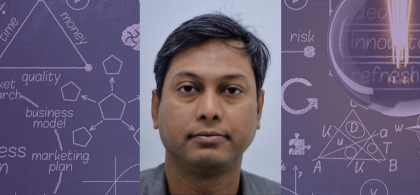
Disabled employees, please speak up… but within limits
Published on 23/09/2025
Why do employees with disabilities struggle to make their voices heard in the workplace? NEOMA researcher Anita Starzyk and a colleague have pinpointed three key obstacles: the identity of the speaker; the limitations of the communication environment; and the disconnect between the issues that should be addressed and the subjects the organisation is willing to hear.
Speaking up, raising problems, putting forward new ideas — companies are increasingly encouraging employee expression in the workplace. In fact, fostering a culture of communication has even become a kind of mantra of modern-day management. And yet, in practice, freedom of expression often ends where hierarchical barriers and organisational priorities begin. Many workers feel that internal communication is overly restrictive, with junior employees in particular feeling their voices are not heard. What are things like for employees with disabilities?
Disabled workers are noticeably absent in organisations. In 2023, only 4.3% of employed people were officially recognised as disabled in France. At the same time, although these employees form the largest minority in the world of work, they pass unseen in corporate hierarchies and are relegated to low-profile positions. They are one of the most marginalised.
So, what happens when disabled workers try to make their voices heard? What particular barriers do they come up against? And why are their voices so often excluded? The study by the NEOMA researcher and her colleague explored the reasons behind this unyielding silence.
Caught in enforced silence due to the dangers of speaking out
In an effort to understand the obstacles specific to disabled employees, the authors of the study combined two fields that have rarely been linked in the past: research into employee voice — i.e., the ability to express oneself to improve one's work environment — and work on disability in a professional context. This cross-disciplinary approach uncovered a new perspective: for disabled employees, speaking out is never a straightforward affair. Every attempt to speak up brings its own dilemma. A dilemma in this scenario denotes a dead end: each option comes at a price or with a risk. Or even on occasion backfires. The researchers identified three major types of dilemmas.
The first dilemma is attached to the identity of the speaker. Should he or she conceal their disability so they are seen as “just another employee”, thereby potentially improving their chances of being heard? Or, quite the opposite, should they “own” their disability, even if it means that their words are categorised as a personal or advocacy-driven statement? In either case, speaking up comes at a price. Downplaying your identity means forfeiting the right to ask for accommodations; highlighting it carries the risk of being assigned a distinct status, and sometimes being viewed as self-serving.
The second dilemma concerns the conditions of expression. Opportunities for speaking up in the workplace often unfold in informal settings such as coffee breaks, drinks after work or via instant messaging. But for disabled people with different impairments and needs, such as mobility restrictions or greater concentration needs, or who cannot use certain digital tools, these spaces are not always accessible or tailored to suit people with diverse disabilities. Speaking up then demands an unseen investment, forcing individuals to confront hurdles without any guarantee of success.
Last but not least, the third dilemma revolves around the substance of what is being said. In many settings, raising concerns about inclusion or disability-related difficulties means deviating from the conventional narrative. The company's priorities lie elsewhere — in its performance, numbers, deliverables and so forth. You want to be heard? Then it's much better to talk business. But how can you advocate for better working conditions or call out discrimination without the danger of being labelled disruptive or out of place? And so, disabled employees are forced to carefully select what is and what isn’t appropriate to say about their circumstances.
The problem isn't a lack of voices; it's a lack of listening
Individually, each of these dilemmas already complicates the act of speaking up. But when they’re combined, it creates an even more daunting dynamic. Why? Because identity, the conditions of expression and what is allowed to be said are deeply connected: each reinforces the other. Given these circumstances, silence is not a voluntary retreat. It is the consequence of an approach to listening that disregards, or even undermines, the realities of living with a disability. And it is exactly this system that the researchers are urging us to reinvent.
This overhaul starts with recognising that not all voices are equal in a company. Fairness is not about making everyone speak in the same voice. It also means designing spaces for expression that are truly accessible, not merely in terms of formats, tools, and tempo, but also in the range of subjects deemed acceptable. Disabled workers don’t just have a voice that deserves to be heard; they also have experiences to be shared and insights into how an organisation operates.
In this respect, the researchers argue that those most impacted deserve more recognition as authorities on their own lived realities. We are also reminded that this is a collective responsibility: co-workers, managers, and directors all have a role to play in ensuring that speaking up is not simply a privilege reserved for “compliant” profiles. As long as organisations won’t consider minority voices, they will deprive themselves of genuine opportunities for change.
Find out more
Starzyk, A. & Bauer, J. F. (2025). Three dilemmas of disabled employee voice. Journal of Business Ethics. https://link.springer.com/article/10.1007/s10551-025-05964-4
Related news
Professor

STARZYK Anita
Dr Anita Starzyk is Assistant Professor in Organizational Behavior at NEOMA Business School and teaches Leadership and Organizational Development in the PGE and GBBA Programs. She holds a Doctoral Degree in Work Psychology from the University of Mannheim and worked as a Research Assistant at the Uni



